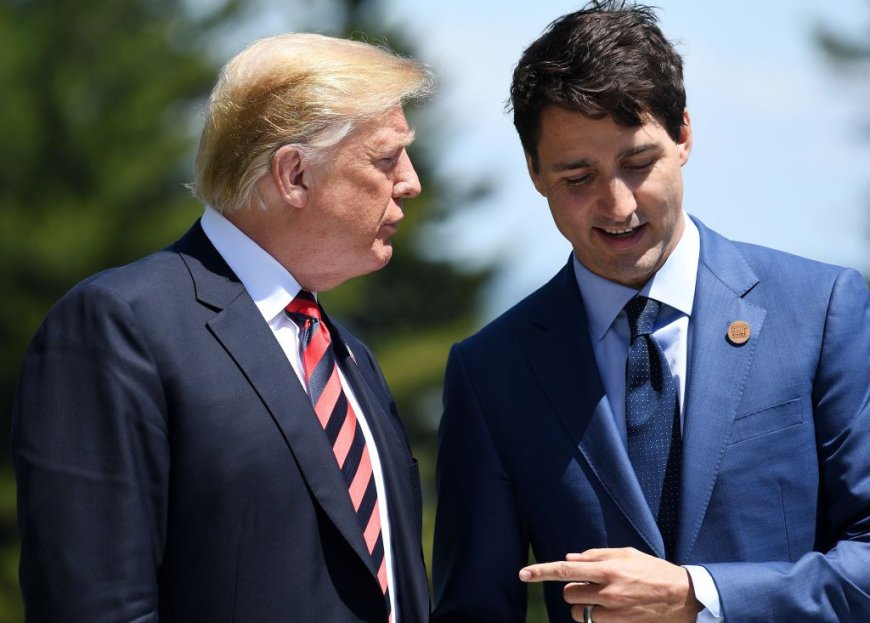Donald Trump Says Canada Should Be '51st State' as Prime Minister Justin Trudeau Resigns
Trump's threat to impose high tariffs on Canadian goods is part of the reason Trudeau lost his job. Now Trump is suggesting there's a way he would reconsider

Trump's threat to impose high tariffs on Canadian goods is part of the reason Trudeau lost his job. Now Trump is suggesting there's a way he would reconsider Photo by Leon Neal/Getty Images
President Donald Trump speaks with Prime Minister Justin Trudeau during the 2018 G7 summit in Quebec:max_bytes(150000):strip_icc():format(jpeg)/GettyImages-969783414-5b1fb4433128340036baecdc.jpg)
President-elect Donald Trump reacted to Canadian Prime Minister Justin Trudeau's decision to resign on Monday, Jan. 6, suggesting that now would be a good time for Canada to join the United States.
"Many people in Canada LOVE being the 51st State," he wrote sarcastically on Truth Social, referencing his running bit that Canada should not be its own country.
"If Canada merged with the U.S., there would be no Tariffs, taxes would go way down, and they would be TOTALLY SECURE from the threat of the Russian and Chinese Ships that are constantly surrounding them," he continued. "Together, what a great Nation it would be!!!"
Related: Justin Trudeau Announces Resignation as Canadian Prime Minister Ahead of Donald Trump's Inauguration Adrian Wyld/The Canadian Press via AP Canadian Prime Minister Justin Trudeau announces his resignation in Ottawa on Jan. 6, 2025
In a press conference on Monday morning, Trudeau revealed that he plans to step down as Canada's longtime leader as soon as a successor is chosen — and though Trudeau's political future had looked uncertain for a while, it was Trump's victory in the November presidential election that helped speed up his downfall.
Prior to the U.S. presidential election, Trudeau's popularity with voters was already dipping in part because of economic challenges like inflation and a housing shortage.
When Trump was elected, his threat to impose 25% tariffs on Canadian goods heightened fears in Canada about their economic stability.
Never miss a story — sign up for PEOPLE's free daily newsletter to stay up-to-date on the best of what PEOPLE has to offer.
Trudeau traveled to Mar-a-Lago in November to meet with President-elect Trump and discuss U.S.-Canada relations, but it didn't seem to defuse the threat of tariffs.
Instead, Trump began mocking Trudeau by saying that Canada should become a U.S. state and calling the prime minister its "governor."
Related: World Leaders Including Justin Trudeau Recorded Talking About Trump When He's Not There: 'Two-Faced,' He Snipes Back David Kawai/Bloomberg via Getty Canadian Prime Minister Justin Trudeau announces his resignation at Rideau Cottage in Ottawa on Jan. 6, 2025
Then in December, Trudeau's standing with fellow Liberal Party lawmakers reached an irreparable low when he tried to demote his once-trusted finance minister after she criticized his proposals for more spending, according to Reuters.
His finance minister quit in frustration, writing in her resignation letter that Trudeau was not prepared for the looming tariff war with Trump and that Canada faces a "grave challenge" if the government does not limit spending and build its reserves.
Mounting criticisms of Trudeau's leadership, coupled with dire polling that predicts major losses for the Liberal Party in the upcoming national election, drove the final nail into his premiership.


























































